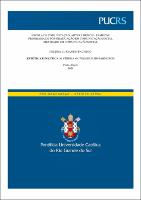| Share record |


|
Please use this identifier to cite or link to this item:
https://tede2.pucrs.br/tede2/handle/tede/9581| Document type: | Dissertação |
| Title: | Estética e política : o cinema outsider de Jim Jarmusch |
| Author: | Pacheco, Helena Lukianski |
| Advisor: | Silva, Melina Aparecida dos Santos |
| Abstract (native): | Esta dissertação é um estudo sobre a relação entre estética e política na filmografia de Jim Jarmusch, expoente do cinema independente americano. Jarmusch construiu uma visão crítica singular sobre o American way of life ao longo de sua carreira. A análise fílmica (AUMONT; MARIE, 2009) será utilizada para investigar como os seus filmes compõem contraposições às “imagens modelares” (CUNHA, 2017) do American way of life e representam modos de vida outsiders (BECKER, 2009). A metodologia também será aplicada para investigar como os espaços vazios (DELEUZE, 1990) em seus filmes funcionam como um dispositivo formalartístico (KING, 2005). Na perspectiva política, essa escolha opera como uma forma de contraposição à subjetividade neoliberal (DARDOT; LAVAL, 2016) que começou a se fortalecer na década de 1980. Trata-se de um modelo crítico que possui uma eficácia que passa pela distância estética, conforme descrito por Jacques Rancière em O Espectador Emancipado (2012). Além disso, observa-se que as narrativas analisadas representam a nação estadunidense em sua complexidade de comunidade imaginada (ANDERSON, 1989), para além da projeção midiática de discursos hegemônicos sobre o modo de vida americano. |
| Abstract (english): | This dissertation is a study on the relationship between aesthetics and politics in the filmography of Jim Jarmusch, an exponent filmmaker in American independent cinema. Jarmusch built a unique critical view of the American way of life throughout his career. The methodology film analysis (AUMONT; MARIE, 2009) will be used to investigate how his films compose contrapositions with the “model images” (CUNHA, 2017) of the American way of life and represent outsiders’ ways of life (BECKER, 2009). The methodology will also be applied to investigate how the empty spaces (DELEUZE, 1990) in his films work as a formal-artistic device (KING, 2005). In the political perspective, this choice operates as a way of opposing the neoliberal subjectivity (DARDOT; LAVAL, 2016) that began to strengthen in the 1980s. It is a critical model that has an efficacy that passes through the aesthetic distance, as described by Jacques Rancière in The Emancipated Spectator (2012). Besides, it is observed that the narratives analyzed represent the American nation in its complexity of imagined community (ANDERSON, 1989), beyond the media projection of hegemonic discourses on the American way of life. |
| Keywords: | Jim Jarmusch American Way of Life Outsiders Subjetividade Neoliberal Jim Jarmusch American Way of Life Outsiders Neoliberal Subjectivity |
| CNPQ Knowledge Areas: | CIENCIAS SOCIAIS APLICADAS::COMUNICACAO |
| Language: | por |
| Country: | Brasil |
| Publisher: | Pontifícia Universidade Católica do Rio Grande do Sul |
| Institution Acronym: | PUCRS |
| Department: | Escola de Comunicação, Arte e Design |
| Program: | Programa de Pós-Graduação em Comunicação Social |
| Access type: | Acesso Aberto |
| Fulltext access restriction: | Trabalho não apresenta restrição para publicação |
| URI: | http://tede2.pucrs.br/tede2/handle/tede/9581 |
| Issue Date: | 19-Mar-2021 |
| Appears in Collections: | Programa de Pós-Graduação em Comunicação Social |
Files in This Item:
| File | Description | Size | Format | |
|---|---|---|---|---|
| HELENA_LUKIANSKI_PACHECO_DIS.pdf | HELENA_LUKIANSKI_PACHECO_DIS | 4.22 MB | Adobe PDF |  Download/Open Preview |
Items in DSpace are protected by copyright, with all rights reserved, unless otherwise indicated.




